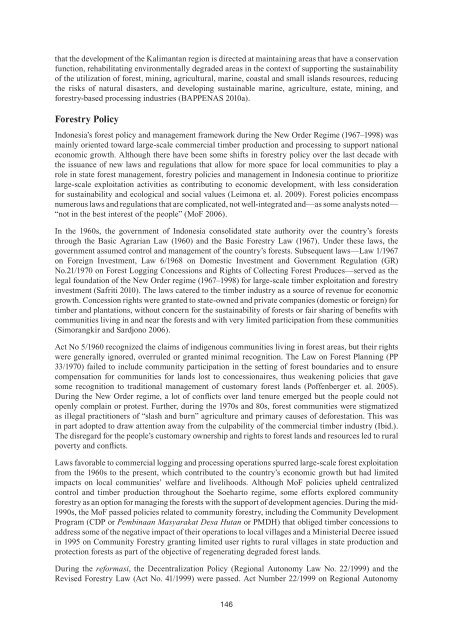Contribution of Forestry to Poverty Alleviation - APFNet
Contribution of Forestry to Poverty Alleviation - APFNet
Contribution of Forestry to Poverty Alleviation - APFNet
Create successful ePaper yourself
Turn your PDF publications into a flip-book with our unique Google optimized e-Paper software.
that the development <strong>of</strong> the Kalimantan region is directed at maintaining areas that have a conservation<br />
function, rehabilitating environmentally degraded areas in the context <strong>of</strong> supporting the sustainability<br />
<strong>of</strong> the utilization <strong>of</strong> forest, mining, agricultural, marine, coastal and small islands resources, reducing<br />
the risks <strong>of</strong> natural disasters, and developing sustainable marine, agriculture, estate, mining, and<br />
forestry-based processing industries (BAPPENAS 2010a).<br />
<strong>Forestry</strong> Policy<br />
Indonesia’s forest policy and management framework during the New Order Regime (1967–1998) was<br />
mainly oriented <strong>to</strong>ward large-scale commercial timber production and processing <strong>to</strong> support national<br />
economic growth. Although there have been some shifts in forestry policy over the last decade with<br />
the issuance <strong>of</strong> new laws and regulations that allow for more space for local communities <strong>to</strong> play a<br />
role in state forest management, forestry policies and management in Indonesia continue <strong>to</strong> prioritize<br />
large-scale exploitation activities as contributing <strong>to</strong> economic development, with less consideration<br />
for sustainability and ecological and social values (Leimona et. al. 2009). Forest policies encompass<br />
numerous laws and regulations that are complicated, not well-integrated and—as some analysts noted—<br />
“not in the best interest <strong>of</strong> the people” (MoF 2006).<br />
In the 1960s, the government <strong>of</strong> Indonesia consolidated state authority over the country’s forests<br />
through the Basic Agrarian Law (1960) and the Basic <strong>Forestry</strong> Law (1967). Under these laws, the<br />
government assumed control and management <strong>of</strong> the country’s forests. Subsequent laws—Law 1/1967<br />
on Foreign Investment, Law 6/1968 on Domestic Investment and Government Regulation (GR)<br />
No.21/1970 on Forest Logging Concessions and Rights <strong>of</strong> Collecting Forest Produces—served as the<br />
legal foundation <strong>of</strong> the New Order regime (1967–1998) for large-scale timber exploitation and forestry<br />
investment (Safriti 2010). The laws catered <strong>to</strong> the timber industry as a source <strong>of</strong> revenue for economic<br />
growth. Concession rights were granted <strong>to</strong> state-owned and private companies (domestic or foreign) for<br />
timber and plantations, without concern for the sustainability <strong>of</strong> forests or fair sharing <strong>of</strong> benefits with<br />
communities living in and near the forests and with very limited participation from these communities<br />
(Simorangkir and Sardjono 2006).<br />
Act No 5/1960 recognized the claims <strong>of</strong> indigenous communities living in forest areas, but their rights<br />
were generally ignored, overruled or granted minimal recognition. The Law on Forest Planning (PP<br />
33/1970) failed <strong>to</strong> include community participation in the setting <strong>of</strong> forest boundaries and <strong>to</strong> ensure<br />
compensation for communities for lands lost <strong>to</strong> concessionaires, thus weakening policies that gave<br />
some recognition <strong>to</strong> traditional management <strong>of</strong> cus<strong>to</strong>mary forest lands (P<strong>of</strong>fenberger et. al. 2005).<br />
During the New Order regime, a lot <strong>of</strong> conflicts over land tenure emerged but the people could not<br />
openly complain or protest. Further, during the 1970s and 80s, forest communities were stigmatized<br />
as illegal practitioners <strong>of</strong> “slash and burn” agriculture and primary causes <strong>of</strong> deforestation. This was<br />
in part adopted <strong>to</strong> draw attention away from the culpability <strong>of</strong> the commercial timber industry (Ibid.).<br />
The disregard for the people’s cus<strong>to</strong>mary ownership and rights <strong>to</strong> forest lands and resources led <strong>to</strong> rural<br />
poverty and conflicts.<br />
Laws favorable <strong>to</strong> commercial logging and processing operations spurred large-scale forest exploitation<br />
from the 1960s <strong>to</strong> the present, which contributed <strong>to</strong> the country’s economic growth but had limited<br />
impacts on local communities’ welfare and livelihoods. Although MoF policies upheld centralized<br />
control and timber production throughout the Soehar<strong>to</strong> regime, some efforts explored community<br />
forestry as an option for managing the forests with the support <strong>of</strong> development agencies. During the mid-<br />
1990s, the MoF passed policies related <strong>to</strong> community forestry, including the Community Development<br />
Program (CDP or Pembinaan Masyarakat Desa Hutan or PMDH) that obliged timber concessions <strong>to</strong><br />
address some <strong>of</strong> the negative impact <strong>of</strong> their operations <strong>to</strong> local villages and a Ministerial Decree issued<br />
in 1995 on Community <strong>Forestry</strong> granting limited user rights <strong>to</strong> rural villages in state production and<br />
protection forests as part <strong>of</strong> the objective <strong>of</strong> regenerating degraded forest lands.<br />
During the reformasi, the Decentralization Policy (Regional Au<strong>to</strong>nomy Law No. 22/1999) and the<br />
Revised <strong>Forestry</strong> Law (Act No. 41/1999) were passed. Act Number 22/1999 on Regional Au<strong>to</strong>nomy<br />
146


